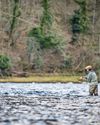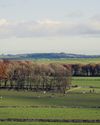
Everest entered the British conscious in 1856, when the Great Trigonometric Survey of India declared that the previously unremarkable Peak XV was, at 29,002ft (8,840 metres), the world’s highest mountain. Just getting the basic theodolite sights – given that the mountain was outside British India and that the closest survey station was 106 miles distant – was a remarkable feat in its own right.
Trigonometry aside, Everest would now go on to become Britain’s last great imperial adventure.
Following this ‘discovery’, it would take almost a century for the world’s highest mountain to be climbed – with the 1953 expedition remembered as an exemplar of organisation, efficiency and leadership. In contrast, the first expeditions in the 1920s have all too often been relegated in popular mythology to a caricature of eccentrics wandering around Everest dressed in tweed – more suitable for the grouse moor than the eternal snows – and tragic heroism. In large part, this was originally down to the pithy wit of George Bernard Shaw who, on seeing the first photographs from an Everest Expedition, declared, “rather like a Connemara picnic surprised by a snowstorm”. He was being wholly unfair.
The ‘discovery’ of Everest coincided with the coming of age of mountaineering. The Alpine Club had been founded in 1857; the major summits of the Alps had all, during ‘The Golden Age of Alpinism’, been climbed by 1865; and despite Queen Victoria’s caustic comments about the Matterhorn tragedy, mountaineering was becoming both established and socially acceptable. The Alpine Club was, after all, a London Gentleman’s Club.
この記事は The Field の February 2021 版に掲載されています。
7 日間の Magzter GOLD 無料トライアルを開始して、何千もの厳選されたプレミアム ストーリー、9,000 以上の雑誌や新聞にアクセスしてください。
すでに購読者です ? サインイン
この記事は The Field の February 2021 版に掲載されています。
7 日間の Magzter GOLD 無料トライアルを開始して、何千もの厳選されたプレミアム ストーリー、9,000 以上の雑誌や新聞にアクセスしてください。
すでに購読者です? サインイン

Rory Stewart - The former Cabinet minister and hit podcast host talks to Alec Marsh about the parlous state of British politics, land management and his deep love of the countryside
The gently spoken 51-year-old former Conservative Cabinet minister is a countryman at heart. That's clear: he even changes into a tweed waistcoat for the interview, which takes place at his London home and begins with a question about his precise career status. Having resigned from the Commons and the Conservative Party in 2019, the former diplomat and soldier has reinvented himself, first with an unconventional but promising run as an independent for the London mayoralty (abandoned because of COVID19 in 2020) and then as a media figure, co-hosting one of the country's most popular podcasts, The Rest Is Politics, alongside Alastair Campbell, the former Labour spin doctor.

Fodder
Local fare with the feel-good factor.

Celebrating the game changers
Once served only in the traditional manner, the fruits of our forays now find their way into all manner of diverse and delicious dishes, say Neil and Serena Cross

The first civil engineer
John Smeaton left an indelible mark on the field of engineering and, three centuries after his birth, his legacy remains as strong as ever

School spirits
From grey ladies and ghostly gardeners to more malign entities, public schools are a rich repository of unnatural phenomena

'A long way from Piccadilly or Pall Mall'
Marking 150 years since the birth of Sir Winston Churchill, Dr Conor Farrington explores this eminent statesman’s often-overlooked 1907 tour of British East Africa: a journey rich with enchanting natural beauty and sporting adventure

Top of the pups
Canines in all their guises were celebrated at The Field Top Dog Awards lunch at Defender Burghley Horse Trials whether eager on the peg, patient at home or perpetually making mischief

Angling for success
It’s never too early to shape up for next season’s salmon and trout, and these top fishing schools are here to help

Talking scents
The canine nose is an astonishingly complex piece of biotechnology that man has harnessed for sustenance and sport for thousands of years

Wall-to-wall excitement
Criss-crossed by formidable drystone walls, the High Peak Harriers’ scenic country provides a day out with an exhilarating difference